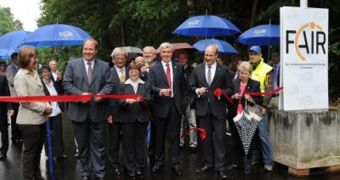Germany is poised to become the world's leader in particle physics research for the next 20 years, now that more than €526 million ($661.4 million) in funds have been approved for the construction of the international Facility for Antiproton and Ion Research (FAIR).
The structure will be located next to the GSI Helmholtz Center for Heavy Ion Research, which is already a world leader in this area of study. FAIR will occupy a total of 20 hectares, experts revealed, right next to the city of Darmstadt.
According to constructors, building the facility will require around 600,000 cubic meters (21,188,800 cubic feet) of concrete and around 35,000 tons of steel. The main purpose of the complex will be the development of new medical therapies.
As an interesting side note, the amount of steel that will be used for constructing this installation is enough to create five Eiffel Towers, EurekAlert reports.
Additionally, an international collaboration of scientists will pay special attention to developing new diagnostics procedures. Moreover, FAIR will be used for researching higher-performance computers, energy-efficient electronics, and advanced materials.
“FAIR will position Germany as the leading light in global atomic and particle physics for the next 20 years,” explained Parliamentary State Secretary Dr. Helge Braun, from the German Federal Ministry of Education and Research.
“The particle accelerator will be at the heart of an international research network, delivering key scientific insights while educating thousands of promising up-and-coming scientists,” he added.
At this time, more than 50 countries and 3,000 scientists are involved in the massive effort required to construct the accelerators and sensitive detectors that will enable FAIR to conduct specific research.
It is currently estimated that around 66 percent of all students that will complete their PhD studies at this facility will go on to work in the industry. “We know from experience that the basic research of today leads to the innovations of tomorrow,” Braun said.
Now that the necessary funds have been awarded, constructors can begin work on the four kilometers of roads that will connect the site to local infrastructure. They will then start drilling the holes necessary for the 1,500 drilled piles that will support the structure. Some will go as deep as 60 meters.
“FAIR is a dream come true for the scientific community – one that is built on passion, perseverance and fantastic support from Germany, the German state of Hesse and our international partners,” concluded the Scientific Managing Director of FAIR, professor Boris Sharkov.

 14 DAY TRIAL //
14 DAY TRIAL //